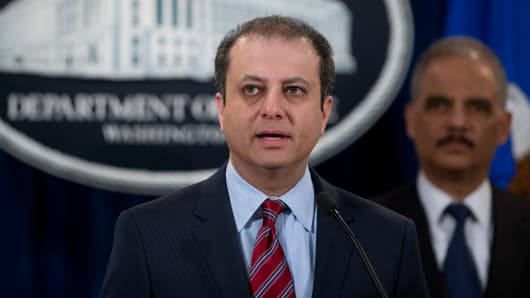More than anyone else, Bharara has obtained justice on behalf of the public. His office aggressively prosecuted individuals for insider trading, securing convictions in over 80 cases — most of which were jury trials. Wall Street executives, including a former director of Goldman Sachs, and hedge-fund managers are currently sitting in prison because of Bharara's efforts.
2. He has made terrorists accountable. While Guantanamo detainees continue to languish in legal limbo, Bharara has punished post-9/11 terrorists effectively and efficiently. Recently, Sulaiman Abu Ghaith, a former al Qaeda spokesperson, was successfully prosecuted by Bharara's office. Abu Ghaith was sentenced to life in prison for terrorism charges — only one year after he was captured.
Read MoreWhat Wall Street should expect from the next AG
Bharara has shown that our federal prosecutors and our civilian criminal justice system are sufficient to handle these cases and, as a consequence, we need not resort to the flexible, ad hoc rules of military commissions to attain favorable legal outcomes. Bharara's experience with terrorism cases may be particularly helpful to the Obama administration, as it continues to struggle with how to make good on an overdue campaign promise to close Guantanamo.
3. Bharara pursues public corruption. For example, his office is investigating whether the Governor of New York, Andrew Cuomo, tampered with a state commission specifically designed to address public corruption. Bharara also stepped in to take open files from the commission when it was clear that the commission would be unable to move forward. Bharara explained quite simply that the work of the people had to be done: "since [the commissioners] were going to be out of business, and since we're still in business, we proceeded," according to capitalnewyork.com.
4. Bharara appears driven by a belief that no one is above the law. An international incident reinforces this point. Last year, Bharara charged Devyani Khobragade, an Indian diplomat, with submitting and facilitating false information related to her domestic worker's visa application. The decision angered Indians abroad. Bharara explained that Khobragade was attempting to evade U.S. law that guards against the exploitation of domestic workers, and that his office's "sole motivation in this case, as in all cases, is to uphold the rule of law, protect victims, and hold accountable anyone who breaks the law."
Read MoreNo one is too big to jail, Bharara says
5. Bharara is independent. He did not succumb to political pressures in the Khobragade case. He refused to let his prosecutorial duties be captured by powerful economic interests. We should want an attorney general who follows where the law takes him, and not be guided by any other considerations.
6. Bharara is a public servant. Bharara has remarked that the person best able to "promote equality, preserve liberty, and prevent cruelty" is the person who is committed to "becoming both a master and a servant of the law." In this sense, Bharara seems to view himself as subservient to the rule of law. This modest perspective on the role of a public official goes back to the Founding era, but is rarely found among today's leaders.
To be sure, Bharara has faced criticisms that he grandstands. In this respect, Bharara may have learned a lesson or two from his former boss, media savvy Senator Chuck Schumer. But much in the same way that a beat cop drives around a neighborhood, Bharara's media appearances may be construed as a high-tech way to remind prospective offenders that he is watching and to induce compliance with the law. In any case, Bharara would be replacing an attorney general known for his attraction to the spotlight and for being ensconced in large entourages.
Read MoreWall Street's top cop talks about his first insider-trading loss
7. Bharara's background is an asset. He was born in India and arrived in the United States at the age of two. His experiences as an immigrant and appreciation for the lure of the United States may, at a human level, inform his work on immigration and the ongoing crises on the border. In addition, as an Indian-American, he avoids the white-black binary that seemed to trouble Holder's tenure as attorney general, and that may weigh down other nominees.
8. He faced the Senate confirmation process—and was unanimously confirmed—in 2009.
9. He has supervised over 200 federal prosecutors in his office, giving him relevant management experience.
10. He has an outstanding pedigree, having graduated from Harvard and Columbia Law School, and worked in the Senate, with prestigious law firms, and as an assistant in the prosecutor's office he now leads.
The nation would be well-served to elevate Bharara from the "Sheriff of Wall Street" to chief federal law-enforcement officer. He can lead on critical issues of ongoing importance to the country, and can help restore the public trust in our governmental officials and institutions.
Commentary by Dawinder S. Sidhu, a law professor at the University of New Mexico. He served as a fellow at the Supreme Court of the United States and as an attorney under the administration of President George W. Bush. He has known Preet Bharara for his entire life — their fathers went to the same medical school. Follow him on Twitter @sidhuUNM.
Read MoreGross exit not about investing strategy: Pimco CEO


